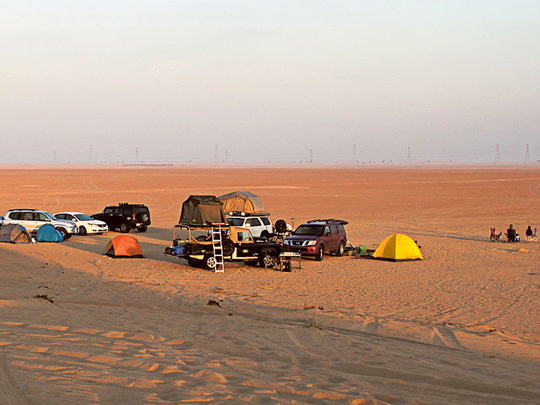
Dubai: With the weather getting cooler and more pleasant, police have urged people to ensure safety precautions when making plans for any outdoor activities.
Camping or going out to the desert is a popular activity for many in the UAE, especially among Emiratis, and many people prefer to go on their own rather than hire the services of desert safari companies.
Lieutenant Colonel Ahmad Atiq Burqibah, Deputy Director of the Search and Rescue Department at the General Directorate of Transport and Rescue at Dubai Police gave tips on how to stay safe when making a desert trip.
“People can get lost if they go far into the desert as there are no landmarks and also lose their phone’s signal, which makes it harder to use the GPS or call for help. Also another risk is that their cars can get stuck in the sand if they are not careful,” he told Gulf News.
It is also important for those heading outdoors to have a first aid kit and be aware of first aid techniques, and to ensure sufficient amounts of fuel in the car, besides water and food, a GPS, flashlights and warm clothes, he added.
Having a satellite phone is also preferable if one intends to venture far into the desert as there is usually very weak or no signal at all in the desert.
“People should not go camping or deep into the desert alone, always have at least one more person with you, and do not be reckless when driving on the sand dunes, as the car easily can flip and kill you or get stuck in the sand,” Lt Col Burqibah said.
Another crucial tip to avoid getting stuck in the sand is reducing the tyre pressure, he said. “The pressure should be between 15-20 PSI. Always ensure that the tyres are in a good condition before heading out.”
Only 4x4 vehicles are recommended for a desert trip as normal cars will certainly get stuck.
Lt Col Burquibah also urged people not to try going into areas where they can’t spot any tyre marks and to stick to trails that have been frequented for their own safety.
“Always park your car at the top of a sand dune so the car will not get stuck in the sand. Do the same if you are erecting a tent — this is so the tent won’t get filled with sand or flood if it rains, and also so cars can see it and not drive over it,” he explained.
Tents he said must be erected against the direction of the wind. Usually, he said, the wind blows from the north in the UAE.
He added that tents pitched in the desert should ideally not have many openings, so insects and reptiles cannot enter it.
Although such incidents are quite rare, people can be bitten by insects, spiders, scorpions or even snakes in the desert.
“One should carry an anti-bite/sting cream, which are sold in all pharmacies. If one gets bitten or stung, they should make a small cut in the place of the bite and try to squeeze out as much of the poison as possible, then apply the cream, then head out to the nearest hospital. People can also call 999 or use the SOS service for help if it’s serious,” Lt Col Burquibah said.
Camel spiders are a common sight in UAE deserts. “Camel spiders do not usually attack people, however they might seem like they are, because they chase the shadow, so people get scared. The most important thing is for people not to panic and move away from the spider.
Cleaning up after having a meal and putting away unused food before going to sleep is important, as leftover food can attract insects and small animals.








